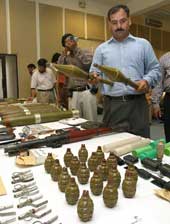 |
| Mukhtaran Mai and her brother Abdul Shakoor in their village Meerwala, near Multan, on Friday. (Reuters) |
Meerwala (Pakistan), June 24 (Reuters): A Pakistani woman gang raped in 2002 on the orders of a village council said she can never forgive her attackers and she hopes they are sentenced to death.
The case of Mukhtaran Mai provoked a national outcry and has focused international attention on the treatment of women in rural Pakistan.
The Pakistani Supreme Court will on Monday begin hearing Mai’s appeal against the acquittal of five of six men convicted of attacking her and sentenced to death.
“Right now I just have one (wish) that, God willing, there is a good decision in the case ... like the first decision,” Mai said in an interview in her village in Punjab province. “They should get the same punishment... the death penalty.”
Mai was gang-raped on the orders of a traditional village council after her brother ? who was 12 at the time ? was judged to have offended the honour of a powerful clan by befriending a woman from their tribe.
Feudal and tribal laws still hold sway in many rural parts of Pakistan.
Asked if she could ever imagine reconciliation with the men who attacked her, Mai said that would be impossible. “I cannot do that; I cannot do that at any cost,” she said. “Can’t you understand this yourself? After all that happened how can there be reconciliation?”
“When a person has suffered such excesses, how can she even hear talk of reconciliation? At least I can’t.”
Six men were originally convicted of the attack and sentenced to death, but five were acquitted after appealing to the Punjab provincial court, which cited a lack of evidence. A sixth had his death sentence commuted to life imprisonment.
”It made me think 'they are the plaintiffs and I am the accused',” Mai said.
The provincial government later intervened and ordered the six detained for three months pending the outcome of Mai's appeal against the acquittal. Another six men who served on the village council were detained at the same time.
All 12 were ordered released by a higher court this month although they remain in detention.
Mai will travel to the capital, Islamabad, for the appeal.
Human rights workers had wanted Mai to go abroad to speak on the plight of women but the government, saying it was acting in the interests of her security, recently banned her from overseas travel.
Following protests from international media and the U.S. government the ban was lifted, but Mai said this week she had still not got her passport back.
Mai said the government had offered to return the passport and she hoped to pick it up in Islamabad next week but she said she had no immediate plan to travel because of the appeal.
Mai has started schools for girls and boys in her village with aid from Canada.
”When these boys grow up, God willing, circumstances will improve in my region,” she said. Asked if she planned to get married, the 33-year old laughed and said definitely, but she wanted her case finished first.
”He should be a decent guy, but he should not interfere in my schools, should not stop me from that work. That's all.”









